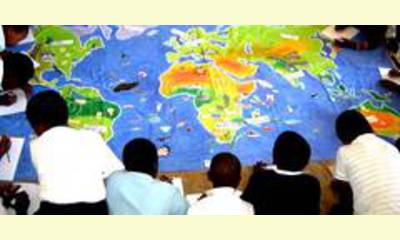|
|
Website launch for 2014 World Conference on Education for Sustainable Development
un article par UNESCO
Preparations and information for the UNESCO World
Conference on Education for Sustainable Development
(ESD) to be held from 10-12 November 2014 in Aichi-
Nagoya, Japan are now available on the Conference’s
website.

click on photo to enlarge
The Conference will mark the end of the United
Nations Decade of ESD (2005-2014), celebrate its
achievements and launch future ESD activities.
Stakeholders can contribute resources and data via
the Conference’s website, which will enrich the
final assessment report of the Decade. The report
will be launched at the Conference.
The website also illustrates UNESCO’s development
of a draft Global Action Programme on ESD as
suggested follow-up to the Decade, in
collaboration with countries and other
stakeholders. In addition, key UNESCO ESD
publications, videos and ESD success stories from
around the world are accessible on the site. The
UNESCO World Conference on Education for
Sustainable Development is organized by UNESCO and
the Government of Japan.
Education for Sustainable Development allows every
human being to acquire the knowledge, skills,
attitudes and values necessary to shape a
sustainable future.
Education for Sustainable Development means
including key sustainable development issues into
teaching and learning; for example, climate
change, disaster risk reduction, biodiversity,
poverty reduction, and sustainable consumption. It
also requires participatory teaching and learning
methods that motivate and empower learners to
change their behaviour and take action for
sustainable development. Education for Sustainable
Development consequently promotes competencies
like critical thinking, imagining future scenarios
and making decisions in a collaborative way.
Education for Sustainable Development requires far-
reaching changes in the way education is often
practised today.
(Click here for a Spanish version of this article or here for a French version).
|








|
DISCUSSION
Question(s) liée(s) à cet article:
Despite the vested interests of companies and governments, Can we make progress toward sustainable development?
* * * * *
Commentaire le plus récent:
[responding to CPNN article The film 'Demain', a manifesto?
Yes initiatives from the grassroots are important and necessary which will have a direct impact on the present and the future. But there are governments like India which are conscious of over exploitation of the earth’s resources and are taking suitable policy measures and also taking legal action against the exploiters.
We must emphasize public transportation and reduce our dependence on individual cars even though the auto industry will not like this.
Otherwise it is not demain but aujourdhui — the problems are there for us to see.

|
|









